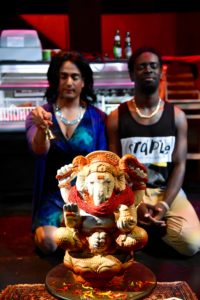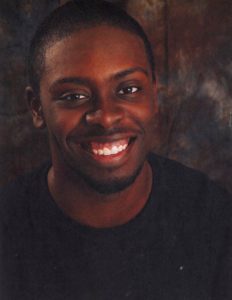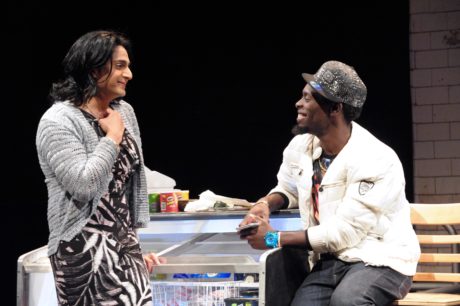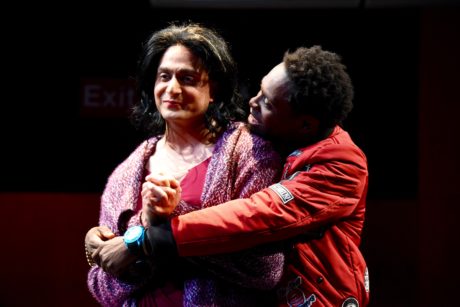After I saw When January Feels Like Summer—Cori Thomas’s counter-stereotypical romantic comedy at Mosaic Theater Company—I found myself thinking back to what happens between two particular characters. One of them is Devaun, a young African American man who grew up in Harlem, where the play is set. The other is an Indian immigrant who first appears as a man named Ishan and then transitions to a woman named Indira.

During the play a bicultural romance begins between Devaun (Jeremy Keith Hunter) and Indira (Shravan Amin) that as written seems quite original in the American theater. It could also hardly seem more improbable. Yet in performance the relationship is beautifully believable and amazingly moving. So I was curious to talk to the two actors who—in playing the sexual chemistry that is scripted between Devaun and Indira—make this unexpected connection delightfully convincing.
There has been a fair amount of cross-gender casting and re-gendering of roles in local theater, notably by companies such as Taffety Punk, Brave Spirits Theatre, and currently Shakespeare Theatre Company. So far, though, there have been few mainstage productions in Metro DC that feature characters who are transgender. Certainly When January Feels Like Summer is among the most high profile. It also stands out among plays with LGBTQ characters because it has an ending so happy it’s practically giddy.
I sat down with Jeremy and Shravan to ask about their process preparing to play Devaun and Indira and their characters’ several scenes together. What I found out confirmed my hunch that these two multitalented actors would have fascinating and important things to say.
John: What were your first thoughts when you read the play?

Shravan: To be honest, it was: Oh, great, here’s another play with an Indian character who has an Indian accent, and there’s going to be a Ganesha [the Hindu elephant deity], and it’s going to be another stereotypical Indian show. I didn’t realize the depth of the role until I started getting into it and working on it.
Jeremy: I was taken aback. Like Shravan, I didn’t want to fall into being portrayed as stereotypical. In the American African community, it’s so easy to be labeled and be perceived and fall victim to this idea of buffoonery. And when you read the words just plain out, it’s hard not to mentally go there. With the way that Devaun mispronounces words and is out of syntax sometimes, that’s the first impression that you get, and I was very hesitant to accept the role. In performing it, though, I found I related to Devaun, because there are parts of myself that just want to hang loose and be free. There’s part of me that talks like that.
In a talkback I attended, Cori Thomas, the playwright, said that an impulse for the play was how you see somebody and you stereotype them and it turns out that they’re not that kind of character.
Shravan: Exactly.
It seems you two had that same experience getting to those characters.
Jeremy: Oh, absolutely.
Take me to the first read.
Shravan: It was very electric.
Jeremy: Oh my god.
Shravan: We were sitting in a circle and all the board members and everybody who was involved in Mosaic were there. It was great. We just—
Jeremy: Fell into it.
Shravan: Both our characters, accents—
Jeremy: Yeah.
Shravan: And people loved it. The comedy was there. And Serge [Seiden], the director, said, “Okay, how do I not mess this up?”
Once you got into rehearsals, how did your characters come to you?

Jeremy: I began imagining the voice. I usually do voice first. How does this character sound? And then from that, motivations come in. Devaun is portions and pieces of my personality. I’m not allowed necessarily to express. You have to be kind of reserved a lot of times in society. So Devaun is “Yes! This is what I want to say, this is how I feel about it!” Devaun is a lot of me.
Shravan, how much of Ishan is you?
Shravan: A lot of the motivations of Ishan and Indira come from me. I’m not trans. A lot that Indira does in her own life—just going for it, being brave enough to transition into a female in her late 20s—is difficult for a trans person. But it’s parallel to my own journey making a leap of faith that I wanted to be a professional actor instead of working as a consultant in front of a computer all day.
What direction did Serge give you?
Shravan: He wanted us to experiment. A few months before rehearsals started, I bought some clothing, loungewear—just trial and error, moving and talking as a woman would, for everyday things like brushing my teeth, getting milk from the fridge, taking a shower. I wanted as much as possible that once I get onstage I don’t have to think about it; the way I move and talk just becomes second nature. My journey as an actor learning how to portray a woman is the same journey Ishan himself would go through, because he’s not years down as a trans woman; he’s transitioning right now in the play.
Did you do other research?
Shravan: I did a lot. I talked with trans women. Natsu Onoda Power [director of The T Party] connected me with Kay Rogers, and she shared her story. I met with a woman named Samia Bahtti, who’s an immigrant from Pakistan and works with the South Asian Indian LGBTQ community called KhushDC. She came out very slowly in her twenties because in Pakistan its hard to do that. She had to fight through a lot of legal hurdles just to get approval to get sex-reassignment surgery. I read Janet Mock’s autobiography. And there’s thousands of people on YouTube who are documenting their transition. They talk about everything. I looked through a lot of that on line to immerse myself.

Did you get advice about pitfalls?
Shravan: A lot of it for me was common sense, because I didn’t want to make a stereotypical trans character. There’s the Indian stereotype and there’s also the trans stereotype. And that’s what I wanted to avoid. Indira is very outgoing and friendly. She wants love and she talks about her body parts—how do I make that not slutty, not flamboyant—?
Jeremy: Not tawdry—
Shravan: Yeah.
I’m getting from you both that you are super conscious of avoiding stereotypes, and that’s a through-line in the work you’re doing. Jeremy, how did you approach playing opposite Indira?
Jeremy: I did my best at all times to not see her as him. In the play I meet Indira. I meet her. I only know Shravan after the play is over.
There’s a lot of conversation now about representation of trans characters on stage. And the thing about theater is that usually a character isn’t really a character until they are seen by another. In When January Feels Like Summer, it isn’t just how the character of Indira is portrayed; it’s how Indira is reflected in Devaun’s response to her. And the chemistry between you two seems instantly credible.
Jeremy: Yeah.
It was funny. It was sweet.
Jeremy: How would Devaun approach a woman that he wanted to get with, you know? And there’s no trans.
Shravan: Yeah.
Jeremy: It’s how do I approach this woman? When you take the trans part out of it, the thought he’s really a guy, the finding it, all of that—it’s nonsense, it clouds the issue. This is your character. This is this character. This is the scene. And the writing makes it easy, ’cause Devaun has no idea.
Shravan: Yeah.
Jeremy: So I’m allowed to just go in and sweep her off her feet. I don’t have to worry about it. By the end of the play I already like her, so it’s not a thing.
Your scenes together seem to me real highpoints in terms of telling trans stories on stage, even though you’re not trans and the author is not. It’s in the acting work that you do, the preparation and the conviction that you bring to it. I’m curious what you’ve noticed about audience reaction. Like when the audience finds out Devaun is attracted to Indira, that’s a big reveal.
Jeremy: Yes.
And then they find out that Indira is attracted to Devaun—
Shravan: I think they’re very receptive. I think they’re rooting for us.
Jeremy: Agreed.
Shravan: Right from the start you can feel that. The first smile he gives to me—the way he looks at me genuinely—the audience laughs. It’s not a laughter of these guys are funny; it’s the laughter of awe turned to laughter.
Jeremy: Yeah.
Shravan: ’Cause it is an awkward situation. Like a first date. Or when you first approach a person to ask them out, it can be very awkward. And when you’re on the sidelines you’re rooting for them but at the same time you’re laughing at that situation.
Jeremy: They are rooting for us and they’re nervous. Because as much as they lose their preconceptions as the play goes on and they discover more about Indira and Devaun, when that moment happens, all those ideas come rushing back. So by the time we get to the end scene, the Ganesha scene, everyone’s like—
Shravan: An audience member at a talkback said, “I was really afraid for Indira, ’cause I’ve heard a lot of bad stories about what happens.”
Jeremy: You can almost feel them like waiting for me to explode or do something, you can feel it.
Shravan: Yeah, you can feel it like this pressure. In a tank.
Jeremy: Then when I get up and walk off stage with her, you can kind of feel people deflate, like awww. It’s like the audience really wanted to be wrong with their notions. Because it’s like, they’ve been so good together, everything else has been fine. And then it’s like a breath of fresh air.
Shravan: Like relief, a burst of laughter.
What’s your favorite line that your character says?
Jeremy: It’s when I say to Jeron [Devaun’s best friend, played by Vaughn Ryan Midder], “I just want to do something for everyone to know that when we walk down the street and sidewalk, we’re not invisible.” As someone who tries to reserve himself, tries to act a certain way, keep myself a certain way all the time, I feel as though I’m walking down the street invisible, as though I’m just a number. It’s only been through recently coming to DC, meeting people, doing these shows, having fun after, that I have actually started to feel like more of a person. So when Devaun says that line—when I say it—I instantly know the feeling, the thing I’m trying to find that sets me apart, so people can look at me and say, There’s something about him. I feel like I’m going through that as my own journey in life. Trying to find that thing that says, You’re special, you have worth, you have value. So that line means a lot to me.

Shravan: Mine is in the first scene with my sister [Nirmala, played by Lynette Rathnam]. I say to her, “The new year has just begun. I have decided to start it on the right foot. I want us to jump into this new year together. Think about it, You and I with new beginnings to look forward to and resolutions to keep.” I want that specific moment to really give hope to the audience, to give inspiration to the audience that despite everything you can do it too. Whatever it is you’re trying to do. It could be career. It could be love. It could be anything. Just taking that chance and going for it, is what I want people to get out of it.
Jeremy, what do you want people to take away from this play?
Jeremy: To not judge a book by its cover. I have so many friends, so many friends and I myself, who are so much like Devaun and so much like Jeron. However, if you were to see Devaun and Jeron walking down the street, you’d probably cross the street. But if you could take the time and talk to them, and give them the benefit of the doubt that there’s something more about them, that’s what I want people to have the courage to be able to do. To say: “You know, normally I’d be apprehensive, but I just saw a play where the guy wasn’t too bad after all. So when I’m sitting on the bus or on the train ride home, maybe I’ll just tune into their conversation and see if there’s a bit more depth—instead of just casting them instantly into this pool of whatever I think it is.” That’s what I want.
Running Time: Two hours 15 minutes, with one intermission.
When January Feels Like Summer plays through June 12, 2016, at Mosaic Theater Company of DC performing in the Lang Theatre at Atlas Performing Arts Center – 1333 H Street NE, in Washington, D.C. For tickets, call the box office at (202) 399-7993 ext. 2, or purchase them online.
LINKS:
Review: ‘When January Feels Like Summer’ at Mosaic Theater Company of DC by David Gerson.
Magic Time! ‘When January Feels Like Summer’ at Mosaic Theater Company of DC by John Stoltenberg.





